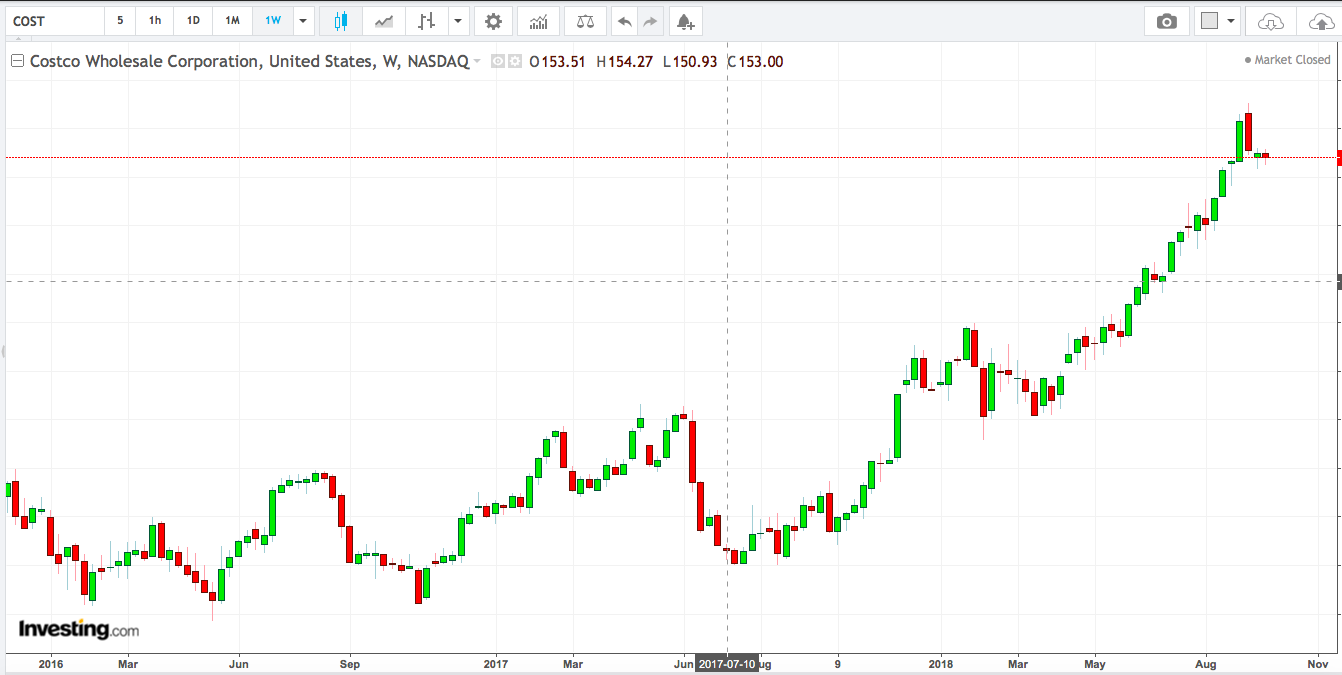Costco (NASDAQ:COST) stock doesn't usually generate a lot of buzz. It's not volatile like some tech and energy stocks. But in its quiet way, Costco has been a slow yet steady climber for the past few years.

That certainly makes Costco a relatively safe bet. But with shares now trading at $234, just 4% off its 52-week high of $245, is it a worthwhile investment for the long run?
Growing Revenue, Loyal Members, Increased Sales
Since the rise of Amazon (NASDAQ:AMZN), brick-and-mortar retailers have seen their sales suffer. Indeed, according to retail think tank Fung Global Retail and Technology, store closings have tripled to 7,000 and are now at record highs. Despite this, Costco's members-only, bulk business model has proven it can hold its own against even the most powerful e-tailers and still grow.
According to its most recent 10-Q, Costco's total revenue year-over-year continues to expand. And it keeps attracting new members—many of whom are extraordinarily loyal. Costco's membership renewal rate is 90% in the U.S. and Canada, with an 87% renewal rate worldwide.
Perhaps more important, same-store sales have continued to increase. During its third quarter, Costco said same-store sales grew by 10%. This is a particularly important metric for investors: it shows that Costco's sales are stable and generated by established stores.
Also, while Costco's trailing price-to-earnings ratio of 34.17 is higher than the Multiline Retail Industry average of 28.31, it's not nearly as high as Walmart's (NYSE:WMT) P/E of 54.30.
Even its exposure to geopolitical risk looks minimal. In general, trade wars increase product costs which hurts retailers, forcing them either raise prices (which hurts sales) or absorb additional costs (hurting profitability). But Costco has a global supply chain, so it doesn't rely on China as its major source of goods.
This means, of course, that though the ongoing trade war between the U.S. and China continues to roil, Costco is fairly well insulated from the fallout. As a result, analysts at Bernstein rated the company "best-prepared for a trade war."
Steady Financials, Surging Consumer Confidence
Since this time last year, Costco's share price has increased almost 44%. But if you've been on the sidelines till now, is this a good time to get in?
Currently, most analysts rate Costco a buy, giving it a one-year price target of $241.48. To date, Costco's stock has steadily pushed higher, now up over 300% since 2009. While that doesn't guarantee a similar future return, it does indicate a healthy past. Still, current price targets are hardly expansive.
If Costco meets this analyst target over the next year, that's only a 3% increase over its current price, making it a poor short-term growth bet. Additionally, Costco is trading near its high, meaning if you buy now, you're paying a premium for where you think the stock will go over the next five to 10 years. Simply put, buying Costco's stock at its current price only makes sense if you plan to hold it for a long time.
But if slow and steady seems like a good proposition as this aging bull market continues its nosebleed-level trajectory higher, Costco might just hit all the right notes. One of the most important metrics to watch when evaluating retail stocks is the Consumer Confidence Index, which is currently at an 18-year high. The index refers to business conditions, and if favorable, signals probable consumer spending in the short- to medium-term—something that directly impacts retailers, including Costco. Additionally, this confidence is projected to continue, positively impacting consumer spending in the future.
If the above isn't enough, Costco's healthy dividend is the proverbial cherry on top. At $2.28 annually it isn't sizable, but since 2004, Costco has regularly increased its payout. Plus, with a payout ratio of just 30.31%, Costco's dividend is sustainable and has plenty of room to grow. As well, since 2012 Costco has rewarded investors with three significant special dividends: $7 in 2012, $5 in 2015 and $7 in 2017.
Even better? There's speculation that the next special dividend could happen sooner rather than later, something that would positively impact Costco's share price, according to CNBC. Of course, it's impossible to know exactly when Costco will next offer its special dividend, so these rumors should be taken with a grain of salt.
Finally, if you feel the economy's current tear isn't sustainable, and think we're headed for an economic downturn, big-box retailers like Costco are fairly "recession-resistant," according to Forbes. During an economic downturn, history has shown that consumers turn from higher-end retailers and gravitate to discounters like Costco. Makes sense of course: discounters such as Costco offer cheaper prices and bulk buying, allowing consumers to purchase more for less.
Bottom Line
Clearly, Costco shares aren't going to catapult higher overnight. If you can live with that there are a number of factors that will likely positively impact the stock going forward, as described above.
Consequently, we believe Costco could be a great asset for any investor looking to protect their portfolio with "safe stocks" that can be bought and held forever, to paraphrase Warren Buffet. Costco shares are now down about 4% since its September 11th high of $245 a share, making for a good entry point for interested investors.
